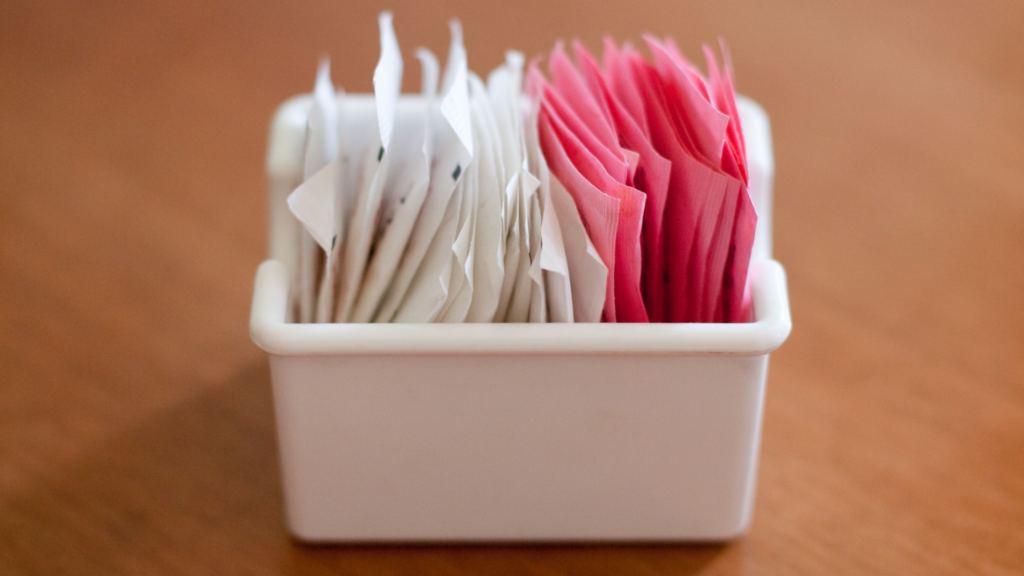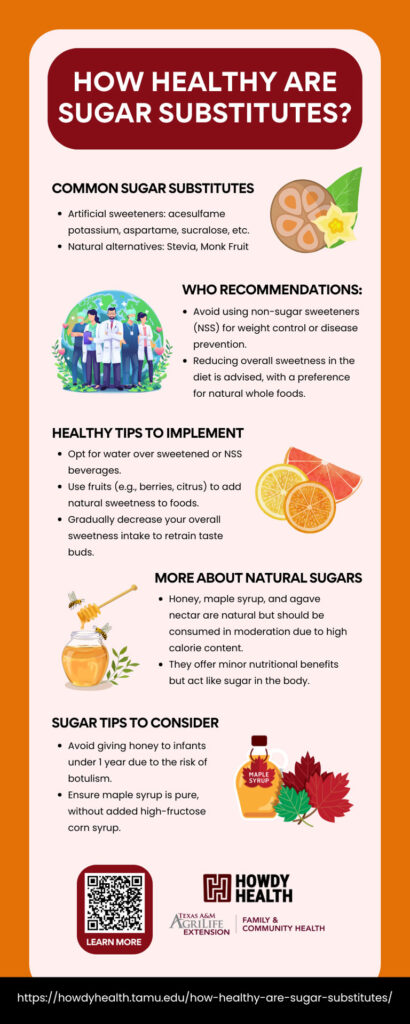Are you confused about sugar substitutes? –Wondering if they’re healthy?
Sugar substitutes are also known as artificial sweeteners, non-nutritive sweeteners, or non-sugar sweeteners (NSS). Examples of common NSS (and their brand names) permitted by the U.S. Food & Drug Administration for use in food include:
- Acesulfame potassium (Sweet One, Sunett)
- Aspartame (Nutrasweet, Equal, Sugar Twin)
- Advantame (no brand names)
- Neotame (Newtame)
- Saccharin (Sweet ‘N Low, Sweet Twin, Necta Sweet)
- Siraitia grosvenorii Swingle fruit extract, aka: Luo han guo (Nectrese, Monk Fruit in the Raw, Purelo)
- Stevia and stevia derivatives (Truvia, PureVia, Enliten)
- Sucralose (Splenda).1,2,3
The World Health Organization (WHO) recently recommended that NSS not be used as a means of achieving weight control or reducing the risk of noncommunicable diseases.1,2,4 Except for individuals with diabetes, this recommendation applies to everyone, including children, all adults, and women who are pregnant or lactating. A systematic review of evidence by the WHO showed that replacing added sugars with NSS does not promote long term weight loss in adults and children. The review also suggest that long term use of NSS could potentially increase the risk of cardiovascular disease, type 2 diabetes, and mortality in adults.1 The WHO noted that “reverse causation” may have contributed to this positive association, meaning that participants with the highest intake of NSS tended to have a higher body mass index, obesity, and/or metabolic risk factors, which may have already predisposed them to chronic diseases.5
Should you give up sugar substitutes?
The WHO recommendation is to reduce overall sweetness in the diet starting early in life and to choose naturally sweet whole foods rather than NSS, which have no nutritional value.1,5
Consider these tips:
- If you’re switching from regular sweetened beverages in an effort to cut calories, switching to NSS will be a lower calorie option. Still, just because it’s calorie-free, doesn’t mean it’s a good thing. It’s still a processed food. So, occasionally having a diet beverage may be ok, but having six is not.6 Choose water rather than sugar-sweetened or NSS beverages as often as you can.
- Turn to fruit for flavoring and sweetness. When you have a sweet craving, choose fresh, canned, frozen, or dried fruits. Just ensure they are in their natural form without added sugars used as preservatives. Try using citrus fruits and their juices, like lemons, limes, or oranges for sweetness and enhanced flavor.6 Berries can also be a sweet addition. Try using mashed bananas, unsweetened applesauce, or blended dates in oatmeal, smoothies, or baked goods for sweetness.7
- Reduce the sweetness of your overall diet.1 Try to move away from adding so much sweetness, in general. Gradually cut down on sweeteners little by little or take a “sweetener sabbatical” for a few weeks to help retrain your tastebuds to savor the natural sweetness of foods.
- Try to move away from added sugar and artificial sweeteners and focus on eating more whole foods. Reducing processed food consumption may help you reduce overall sweetener consumption.
What about other natural sugars?
You may have heard that honey, maple syrup, and/or agave nectar could be better, natural sweetener alternatives. Bees produce honey from flower nectar; maple syrup is made by boiling tree sap to reduce its water content until it becomes a solid sugar; and agave nectar comes from the fluid of the blue agave plant. Thus honey, maple syrup, and agave nectar are all considered natural sugars because they occur naturally and are made without added sugars. However, they are often high in calories without providing significant nutritive value and should therefore be consumed in moderation.
In terms of benefit, honey, maple syrup, and agave nectar contain trace amounts of minerals and vitamins, which are not present in table sugar or NSS. Raw honey and pure maple syrup both contain antioxidants and have prebiotic oligosaccharides that help feed gut flora (which can help keep your digestion on track).8
“The thing to remember about natural sources of added sugar: In terms of your weight and blood sugar, they behave just like sugar.”8
So, if you’re substituting one of these options for table sugar, you might gain a small amount of benefit, but the bottom line is this: While some natural sweeteners provide a few more nutrients than table sugar, they’re all still forms of sugar and are high in calories, should be counted toward your daily sugar intake, and just like refined sugar should be limited.8
Notes of Caution:
Honey should never be given to infants under 1 year old because it may contain botulism bacteria spore, which are a serious health risk for infants.
Maple syrup brands may contain significant amounts of high fructose-corn syrup, which is not a natural sweetener. Read the food label to be sure you’re getting pure maple syrup when choosing this option.8
Infographic
Download the PDF or share the image below to help others learn more about how healthy are sugar substitutes.
- Who advises not to use non-sugar sweeteners for weight control in newly released guideline. World Health Organization. May 15, 2023. Accessed July 11, 2024. https://www.who.int/news/item/15-05-2023-who-advises-not-to-use-non-sugar-sweeteners-for-weight-control-in-newly-released-guideline.
- American Council on Exercise. Everything you need to know about non-sugar sweeteners. ACE. May 22, 2023. Accessed July 11, 2024. https://www.acefitness.org/resources/everyone/blog/8368/everything-you-need-to-know-about-non-sugar-sweeteners/.
- Harvard T.H. Chan School of Public Health. Low-calorie sweeteners. The Nutrition Source. May 9, 2024. Accessed July 11, 2024. https://nutritionsource.hsph.harvard.edu/healthy-drinks/artificial-sweeteners/.
- Chatelan A, Raeisi-Dehkordi H, Salehi-Abargouei A. Substituting Low-Calorie Sweetened Beverages for Sugar-Sweetened Beverages to Prevent Obesity and Cardiometabolic Diseases: Still a Good Idea?. Curr Dev Nutr. 2024;8(3):102105. Published 2024 Feb 13. doi:10.1016/j.cdnut.2024.102105.
- Harvard T.H. Chan School of Public Health. Unpacking who guidelines on non-sugar Sweeteners. The Nutrition Source. June 6, 2023. Accessed July 11, 2024. https://nutritionsource.hsph.harvard.edu/2023/06/06/who-guidelines-non-sugar-sweeteners/.
- Adams H. Confused about sweeteners after new recommendation? MUSC dietitian has answers. Medical University of South Carolina (MUSC). May 22, 2023. Accessed July 11, 2024. https://web.musc.edu/about/news-center/2023/05/22/confused-about-sweeteners-after-new-recommendation-musc-dietitian-has-answers.
- Johns Hopkins Medicine. Facts about sugar and sugar substitutes. June 20, 2024. Accessed July 11, 2024. https://www.hopkinsmedicine.org/health/wellness-and-prevention/facts-about-sugar-and-sugar-substitutes.
- Cleveland Clinic. Best (and worst) ways to Sweeten Your Food. Cleveland Clinic. June 14, 2023. Accessed July 11, 2024. https://health.clevelandclinic.org/best-and-worst-sugar-substitutes.





